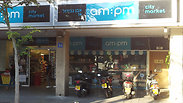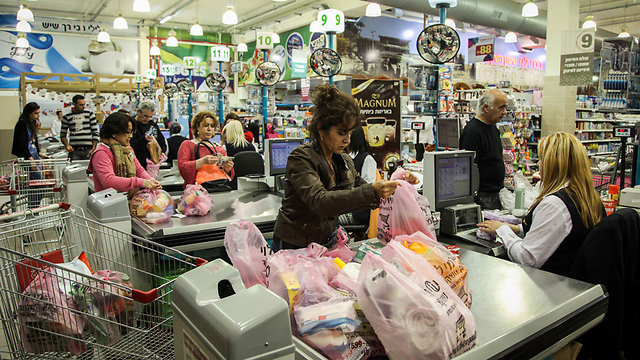
Ministers thwart Shabbat legislation
Interior Minister rejects sections of Tel Aviv bylaw allowing market stores to open on Saturday while Livni abstains from vote on public transport on the weekend.
Tel Aviv's secular residents suffered a double blow in their fight for freedom from religion on Sunday when Interior Minister Gideon Sa'ar and Justice Minister Tzipi Livni thwarted two pieces of legislation that would allow the opening of businesses during Shabbat and the operations of public transport during Judaism's weekly day of rest.
Interior Minister Sa'ar prevented the Tel Aviv municipality from legalizing the opening of market stores on Saturday.
Sa'ar rejected several of the clauses in the municipal law, but approved, among others, allowing commercial complexes at the Tel Aviv Port, the Jaffa Port, "Hatachana" complex in Neve Tzedek and gas station convenience stores to open.
Related stories:
- Tel Aviv to allow grocery stores to open on Shabbat
- Tel Aviv's rabbi slams mayor: City is annulling Shabbat
- Tel Aviv wants buses on Shabbat
Last March the municipality approved a plan designed to regulate the opening of businesses on Shabbat, and in fact preserve the status quo. The municipality even defined how many shops would remain open on any given main street, in accordance with the number of supermarkets that are currently open on Shabbat against the law.
The amendment to the municipal bylaw was created following the Supreme Court's ruling last June that determined the Tel Aviv municipality did not adequately enforce the ban on the opening of businesses on Shabbat. Municipality inspectors used to give fines to major supermarket chains such as AM:PM, but allowed them to stay open. The small businesses who were not treated with the same type of leniency, sued the municipality and the Supreme Court agreed with their claims.
The bylaw, that passed in the municipality, required the approval of the interior minister.
"The explanations attached to the municipal bylaw's draft are just general explanations which are not sufficient and raise more questions than provide solutions," Sa'ar said.
"There are no explanations as to how it was decided on which streets to open grocery stores; what characterizes these streets; why on one street only one grocery store was allowed to open on Shabbat and in another a higher number of grocery stores were allowed to open; or why these rules apply specifically for supermarkets with an area of up to 800 square meters," he continued.
"Those criminal business owners who operated illegally for years, opened their businesses on Shabbat despite the prohibition to do so, will now be rewarded in the form of an official permission to open their businesses. The official permission originates from their illegal activity in the period that preceded the bylaw amendment. I believe that the permission will encourage criminal activity," Sa'ar asserted.
"The bylaw also bestows the mayor with the authority to give unlimited permissions for additional businesses in the future without specified criterions and without an approval of the Tel Aviv city council," he concluded. "This bylaw disproportionately harms the Shabbat day as the general rest day in Israel."
In response to Sa'ar's comments, Tel Aviv Mayor Ron Huldai stressed that he is going to operate with every legal option possible in order to maintain Tel Aviv's unique character – including taking the case to court.
"We regret the Interior Ministry's decision, which takes Tel Aviv–Jaffa and the entire country decades backwards," said Huldai.
According to him, Sa'ar's decision hurts municipal democracy, since the decision to open grocery stores in certain areas in the city was approved by a large majority in the city council.
"The city council's decision was proportionate, balanced and reflected the reality in the city for many years. Just like in Bnei Brak the municipality is allowed to close all businesses and in Nazareth to open all businesses, Tel Aviv should have a municipal bylaw to help keep the Shabbat in Tel Aviv–Jaffa and other cities like it, in its unique way," said Huldai.
Finance Minister Yair Lapid also came out against Sa'ar's decision, saying it was "surprising and we strongly oppose to it. Just as the ultra-orthodox seek to maintain the status-quo in Jerusalem, the most secular city in Israel deserves to keep its unique lifestyle as the 'city that never sleeps.'
"The interior minister's decision creates unnecessary conflict between religious and secular residents and does not contribute anything to the Jewish character of Israel – quite the opposite, it creates unnecessary tension in a city that everybody in it has been living in peace until now," added Lapid.
Livni thwarts public transportation
A bill proposal to allow public transportation on Shabbat was also rejected on Sunday. The bill, proposed by Meretz MK Nitzan Horowitz, was rejected at the Knesset's Constitution, Law and Justice Committee mainly due to Justice Minister Tzipi Livni's decision to abstain from voting. Three ministers voted in favor, three voted against and three abstained, including Livni.
Livni explained her decision by saying that "there should be public transportation, but not entirely – the Shabbat is a special day and should be kept as such, for seculars too. Proper and proportionate arrangements need to be made on this matter."
"The bill was meant to be of service to those who do not own a car, in order to get around in reasonable prices via public transportation," said Horowitz.












